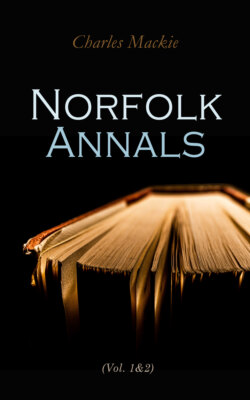Читать книгу Norfolk Annals (Vol. 1&2) - Charles Mackie - Страница 240
На сайте Литреса книга снята с продажи.
FEBRUARY.
Оглавление2.—The petition of the Norwich Grand Jury at the last Summer Assizes, praying for two general gaol deliveries in the year, was presented to the House of Commons by Mr. W. Smith. Mr. Colborne, member for Thetford, presented another petition from the Mayor and Corporation of that borough, praying that there should be no change in the existing arrangements. On the 24th the Corporation of Norwich petitioned Parliament in favour of Assizes being held twice a year in the city.
—At a general Court of Guardians held at Norwich, Dr. Rigby reported that small-pox had made its appearance in several parishes in the city, and an order was made that the city surgeons vaccinate all poor persons desirous of availing themselves of their assistance.
3.—Mr. J. W. H. Payne, a native of Norwich, where he was formerly a printer and bookseller, “being reduced in circumstances was allowed to appear at the Theatre in the character of Hamlet. He succeeded in exciting the risibility of the other performers, and the loud laughter of the audience.”
Impromptu on Mr. Payne’s Performance as Hamlet.
“Let mortal man his grief and care give o’er,
Nor crave the aid of potion or of pill;
For Payne now makes our sides with laughter sore,
And, tho’ he threatens, yet—neglects to kill.”
8.—Mr. Mathews appeared at Norwich Theatre as Solomon Gundy (“Who Wants a Guinea?”). His impersonations on succeeding evenings included Scrub (“The Beaux’ Stratagem”) and Goldfinch (“The Road to Ruin”). He also gave his entertainments, “A Trip to Paris,” “At Home,” and “The Actor of All Work.”
9.—At a general meeting of the Norwich Paving Act Commissioners a plan submitted by Mr. Gostling, of Birmingham, for lighting the city with gas was taken into consideration, and on the motion of Mr. P. M. Martineau it was agreed, by 26 votes to 17, that “it is expedient to light such parts of the city with gas on the plan suggested and that the necessary steps be taken to carry the plan into effect.” A committee was also appointed to further the project. On September 30th a meeting was held at the Guildhall for the purpose of receiving information relative to the proposed introduction of oil gas. The meeting was adjourned until the 25th, when the Mayor was invited to call a public meeting. The Paving Commissioners met on October 12th, when permission was given to break up the streets to lay down pipes, provided that such breaches were repaired to the satisfaction of the City Surveyor at the expense of the promoters. A public meeting was held on October 26th, at which it was recommended that a company be formed for the purpose of lighting the city with oil gas, and that not less than £2,500 be raised in shares of £25 each for carrying the resolution into effect. Two separate bodies appear to have come into existence, the one known as the Oil Gas Company, and the other as the Oil Gas Community. These bodies adjusted their differences, and on December 1st Mr. Charles Harvey obtained leave in the House of Commons to bring in a Bill for lighting with gas the city and county of the city of Norwich. The Bill was read a second time on December 21st, and in due course became law. On January 31st, 1820, the first of the iron gas pipes were laid in the Market Place; and on May 10th, 1820, the street lamps and burners in several shops were lighted with gas for the first time. “In the Market Place it produced a strong and steady light as far as it extended, and before Messrs. Bignold’s house and office in Surrey Street, where there were three lamps, the effect was brilliant.”
12.—A salmon measuring 48 inches in length, 23 inches in girth, and weighing 33 lbs., was caught at the New Mills, Norwich. “These fish, which are frequently taken in the same place, are mistaken by some for trouts or salmon trouts.”
15.—Miss Booth, of Covent Garden Theatre, appeared at Norwich Theatre as Letitia Hardy (“The Belle’s Stratagem”). Her other impersonations included Little Pickle (“The Spoiled Child”), Helen Worret (“Man and Wife”), Priscilla Tomboy (“The Romp”), Angela (“The Castle Spectre”), Amanthus (“Child of Nature”), and Mary (“The Innkeeper’s Daughter”).
16.—Miss Fanny Brunton made her début at Lynn Theatre as Una (“The Wood Demon”). Mr. Brunton spoke an introductory address. At the close of the Lynn season, Mr. Brunton and his company proceeded to Birmingham, where he had engaged the Theatre on his own account.
18.—Died in London, Sir Thomas Berners Plestow, Kt., of Watlington Hall, aged 70.
20.—Elizabeth Wells, wife of Robert Wells, of Gressenhall, gave birth to four living children—three boys and a girl.
24.—The honorary freedom of the city was conferred upon Mr. R. H. Gurney, M.P., for Norwich.
—The portrait, by Clover, of Mr. B. Leman, Alderman of Norwich, was ordered to be placed in St. Andrew’s Hall.
—The Corporation of Norwich petitioned Parliament praying that the punishment of death for the crime of forgery be commuted for one less severe, and for a general revision of the penal laws.
27.—One John Larkin was apprehended at Norwich “on a strong suspicion of being the person who stole a bag containing £4,739 in notes belonging to the Fakenham bank, on August 13th, 1817, from the messenger’s gig, which was conveying it from Messrs. Gurney’s bank in Norwich.” (There is no further reference to this case.)
Died, this month, aged 100, Thomas Goodings, carpenter, of Lammas.
